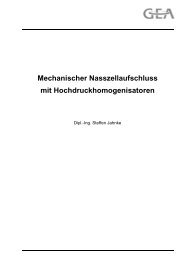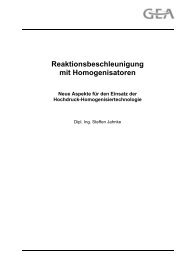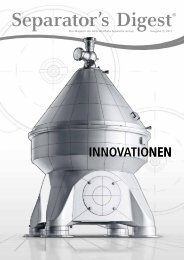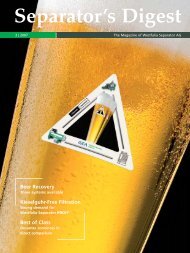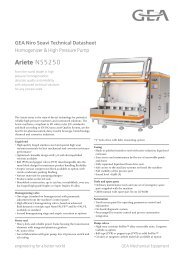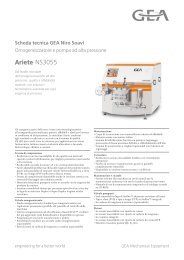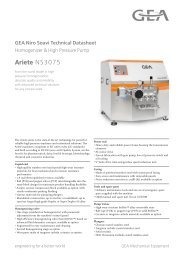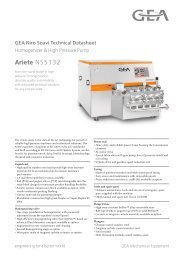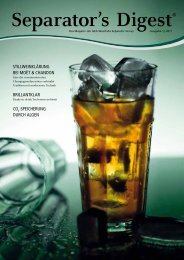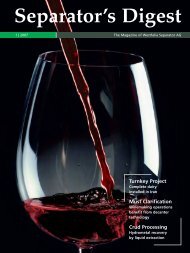Separator's Digest 2004/1 - GEA Westfalia Separator Group
Separator's Digest 2004/1 - GEA Westfalia Separator Group
Separator's Digest 2004/1 - GEA Westfalia Separator Group
- No tags were found...
Create successful ePaper yourself
Turn your PDF publications into a flip-book with our unique Google optimized e-Paper software.
<strong>Separator</strong>s and decanters operateon a continuous basis, areextremely efficient at separationand clarification and require minimumenergy and labour input. Downstreamprocessing methods for theentire effluent production can be minimizedin terms of size, thus reducinginvestment costs. There is no doubt thatcentrifugal separation is a practicaland economic technology for the environmentalprotection of breweries.Lower costs,higher yieldBrewery effluent consists primarily oftwo main streams. The first streamconsists of residues discharged fromthe production process. In addition tosubstances in solution, such as fermentablesugar, a wide range of solids canbe present in this product stream –yeast and diatomaceous earth forexample.“If such a productionstream is separated intoits solid and liquidcomponents with aseparator or decanter,the effluent volume andload are reduced.”At the same time, valuable substancescan be recycled back into production.This approach not only reducescosts, it also increases the process yield atthe same time. The necessary size of theinstallation for processing the effluentcan also be reduced, and this in turn reducesthe size of the overall investment.Extremely versatileThe second main stream of breweryeffluent comes from the cleaning processes.Fermentation and storage tankcleaning as well as cask and bottle rinsingare the main contributory factors.It also makes sense for centrifuges tobe used in this effluent stream. Forinstance, environmentally friendly andeconomical recycling of bottle washlye with separators or decanters hasproduced good results and makes amajor contribution towards protectionof the environment.Initially anaerobicor aerobic treatmentUnlike the processused for recoveringvaluable substances,direct separation ofthe overall effluent isgenerally not advisable.In most cases,the effluent containstoo many dissolved substances whichcannot be separated using separationtechnology. An anaerobic or aerobictreatment in a works effluent treatmentplant should, therefore, be carriedout first. The production effluent firstundergoes preliminary purification ina strainer filter. After the pH value hasbeen adjusted and nutrient has beenadded, the water can be pumped intoan anaerobic reactor. The biogas whichis obtained in this reactor can be usedby the brewery for generating energy.The wet sludge is then disposed of andthe water then passes to the aerobicstage in the second step. The waterdischarging from this stage can first bepassed through a sand filter and theneither be discharged into the seweragesystem or used as industrial water inthe plant.Sludge volumereduced by decantersIdeally, a decanter for sludge dewateringis installed downstream of theaerobic stage. Decanters continuouslyseparate suspensions into liquids andsolids. Separation takes place in a rotatingbowl, a coaxially installed conveyorscroll. Compared with the processof sedimentation under gravity,decanters generate forces which areup to 4,000 times higher on the solidparticles. Under the effect of centrifugalforce, the solids sediment out andsettle very quickly. The scroll catchesthe solids and conveys them out of thedecanter. The sludge is dewatered inthis way, and the liquid phase is recycledback to the aerobic stage. The volumeof the dry substance is reduced,which means that disposal is simplerand less expensive. ■Uwe CarstädtProject Management<strong>Westfalia</strong> <strong>Separator</strong> Umwelttechnik, OeldeTel.: + 49 25 22/77-27 84carstaedt.uwe@gea-westfalia.de<strong>Separator</strong>´s World33<strong>Separator</strong>´s <strong>Digest</strong> 1/<strong>2004</strong>



